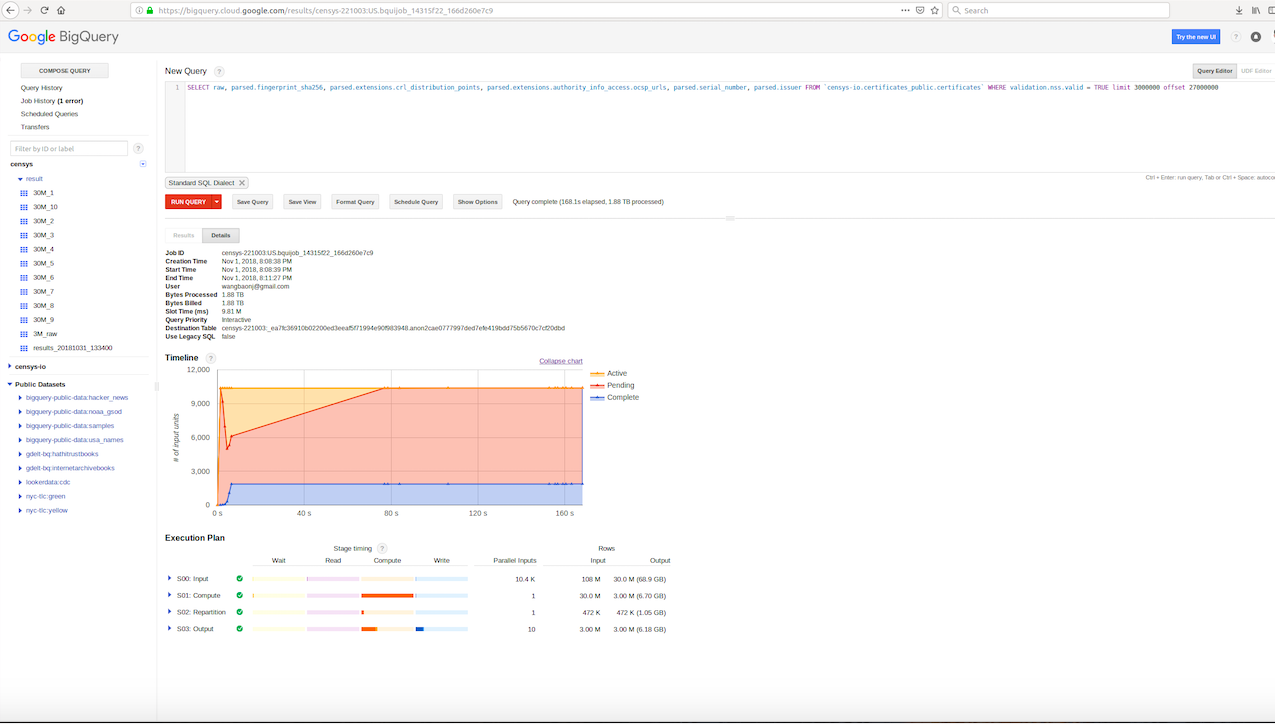This collection of tools is designed to download certificates from Censys, classify them into revoked and non-revoked. This tool is largely based on casebenton's github (https://github.com/casebenton/certificate-revocation-analysis). The main improvement is to download Censys database using Google BigQuery and also solve several critical bugs.
- A Censys Researcher Account (for downloading certificates)
- About 100GB(30 Million certificates) of space to store certificates and associated data
- Python 2 & Python 3 (default is to use Python 2 except when explicitly noted)
- Aria2c (or wget or Curl)
- pyopenssl (at least version 16.1.0)
- Lots of patience, if you also deal with 30 Million datas, you need to spend more than three days to download and run scripts.
- After obtaining a researcher account on Censys, perform the following SQL on Google BigQuery to collect 30 million valid NSS-trusted certificates.
SELECT raw, parsed.fingerprint_sha256,
parsed.extensions.crl_distribution_points,
parsed.extensions.authority_info_access.ocsp_urls,
parsed.serial_number, parsed.issuer
FROM `censys-io.certificates_public.certificates`
WHERE validation.nss.valid = TRUE limit 30000000;
 Get the result in JSON format.
Get the result in JSON format.
- Download the exported certificates, unzip them and place their contents in a single, unified file.
Unzip with
gzip -u *.gz, then unify the files withcat *.json > certificates.json. Then you can delete all files except forcertificates.json.
-
Set
get_CRL_revocationsas the working directory. This folder contains all scripts for Part B. -
Extract the CRL distribution points by running
python extract_crls.py. This script will output three files: a file of all certificates which have listed CRLs(../certs_using_crl.json), a file of all certificates which do not list a CRL(../certs_without_crl.json), and a list of all CRL distribution points (CRL_servers). -
Sort and eliminate duplicate entries in
CRL_serversusing the commandsort -u CRL_servers > CRL_servers_final. -
Download all of the CRLs listed in
CRL_servers_final. First create a new subdirectoryraw_CRLs, set it as the working directory, then runaria2c -i ../CRL_servers_final -j 16. There are some errors when downloading these certificates, I just ignore them. -
Set the working directory back one level up (to
get_CRL_revocations). Runpython3 build_megaCRL.pyscript (note that this must use python3 and pyopenssl version 16.1.0 and above). This will outputmegaCRL, which contains all revocation serial numbers organized by CRL. Also you can usepython count_serials.pyto see the total number of revocation serials that are contained in the megaCRL. -
Make a new subdirectory
revokedCRLCerts, then match the revocation serial numbers to known certificates usingpython build_CRL_revoked.py. This script uses multiprocessing to get around the I/O bottleneck, and you may need to adjust the number of "worker" processes to get optimal speed on your machine. Each worker has a dedicated output file, so after the script you will need to combine each output file into a single, final result usingcat revokedCRLCerts/certs* > ../final_CRL_revoked.json. -
Count the number of actual revoked certificates using
wc -l final_CRL_revoked.json.
-
Set
get_OCSP_revocationsas the working directory. This folder contains all scripts for Part C. Make a subdirectory calledOCSP_revoked. -
Use
python build_OCSP_revoked.pyto determine all Let's Encrypt revocations. This tooling replicates the process of the CRLite authors, and I believe they made this design choice to only include OCSP for Let's Encrypt based off the statistic that the vast majority of OCSP-only certificates are issued by them. After the script completes, combine the results of each worker into a final output file withcat OCSP_revoked/certs* > ../final_OCSP_revoked.json.
-
Set
build_filteras the working directory. This folder contains all scripts for Part D. Make subdirectoriesfinal_unrevokedandfinal_revoked. -
Use
python build_final_sets.pyto convert the data created from the steps above into a single set of all revoked certificates and all valid certificates. This script uses multiprocessing, so after running the script you will need to usecat final_unrevoked/*.json > ../final_unrevoked.jsonandcat final_revoked/*.json > ../final_revoked.jsonto combine the results of the individual workers into a single file. Finally usesort -u final_revoked.json > final_revoked.jsonandsort -u final_unrevoked.json > final_unrevoked.jsonto remove potentical duplicates.